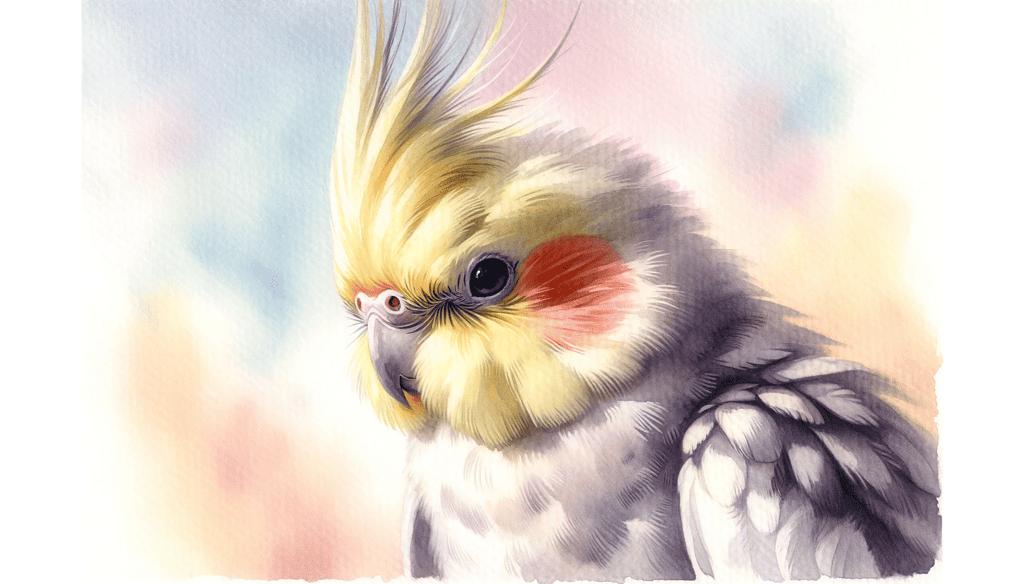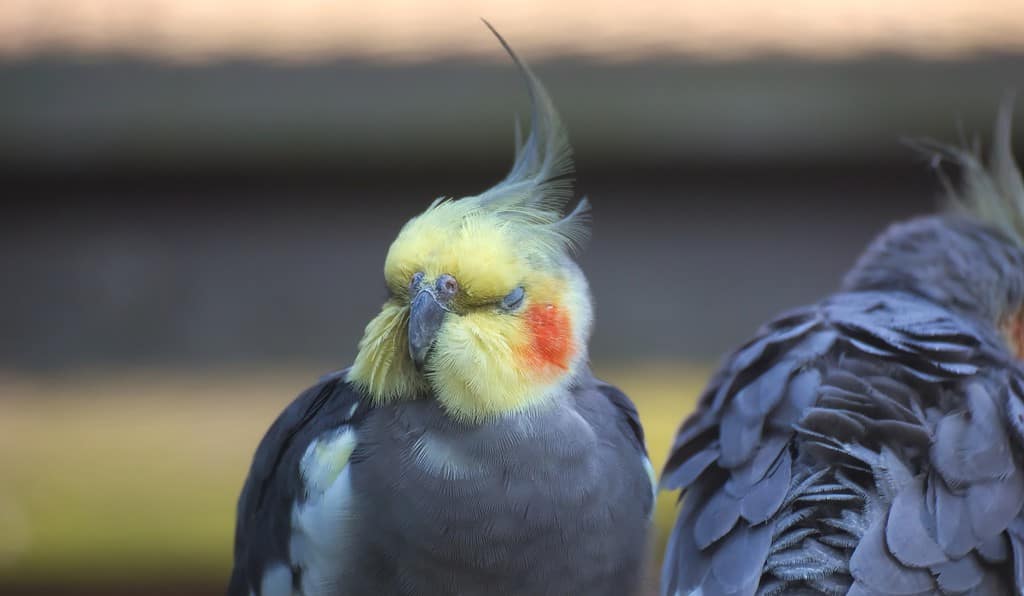
Cockatiels, with their vibrant personalities and expressive behaviors, are more than just pets; they’re companions that bring joy to our lives. But have you ever wondered if your feathered friend can feel sad? How do you know if your cockatiel is experiencing more than just a bad day?
As a general rule, cockatiels show sadness through changes in behavior and physical signs. These can include altered vocalizations, feather plucking, and changes in eating habits. Recognizing these signs is crucial for their well-being.
In the following sections, we’ll explore the subtle cues and behaviors that indicate your cockatiel might be sad. Understanding these signs is key to providing the best care and ensuring a happy, healthy life for your beloved bird. Keep reading to learn how to spot and address these signs effectively.
Do Cockatiels Get Sad?
Yes, cockatiels can experience sadness. They possess neurotransmitters in their brains, such as serotonin and dopamine, which play a significant role in their emotional states. Serotonin, for example, is key in regulating mood, anxiety, and aggression in birds. Normal levels of serotonin contribute to a happier and more content state in your cockatiel.
Conversely, a decrease in this hormone can lead to feelings of sadness and depression. Dopamine also has a crucial role, as it’s associated with pleasure and reward. Lower levels of dopamine can result in moodiness and a sense of depression, as it’s integral to your bird’s sense of well-being and happiness.
Signs Your Cockatiel Might Be Sad
Just like us, cockatiels can experience a range of feelings, including sadness. Recognizing these signs is crucial for their well-being. Let’s delve into the indicators that suggest your cockatiel might be feeling down.
Physical Signs
- Fluffed-Up Feathers: When a cockatiel keeps its feathers fluffed up, it’s often more than just feeling chilly. This can be a sign of discomfort or unease. In a healthy state, their feathers lie smooth against their body.
- Feather Plucking: This is a clear distress signal. When cockatiels are sad or stressed, they might start plucking their own feathers. It’s heartbreaking to see, but understanding this behavior can help us address their underlying issues.
- Loss of Appetite: Just like you might lose your appetite when feeling blue, cockatiels do the same. A noticeable decrease in eating can be a sign of emotional distress.
- Stress Bars: These are horizontal lines across the shafts of their feathers. Stress bars can indicate that your cockatiel is going through a rough patch, possibly feeling sad or anxious.
- Changes in Droppings: Yes, even their droppings tell a story. Significant changes in the color, consistency, or frequency can be indicators of emotional or physical health issues.
Behavioral Signs
- Aggression: A normally gentle bird turning aggressive can be a sign of emotional distress. This could manifest as biting or resisting interaction.
- Repetitive Behaviors: Watch for actions like pacing or repeated head bobbing. These can be signs of boredom or frustration, often stemming from sadness or stress.
- Excessive Vocalizations: If your cockatiel is unusually loud or making sounds more frequently, it could be trying to communicate its unhappiness or discomfort.
Causes of Sadness in Cockatiels

Identifying the root cause of your cockatiel’s sadness is essential for providing the right care and support. I’ve seen various factors that can impact their emotional state.
1. Environmental Causes
- Change of Routine: Cockatiels thrive on routine. A sudden change in their daily schedule can be unsettling and lead to stress.
- Unsuitable Environment: Factors like inadequate lighting, lack of space, or excessive noise can greatly affect their mood.
- Poor Diet: Nutrition plays a crucial role in their emotional well-being. An imbalanced diet can lead to health issues and emotional distress.
2. Social Causes
- Mean Cagemates: Just like us, cockatiels can be bullied by their peers. Aggression from cagemates can cause significant stress.
- Lack of Social Interaction: These birds are social creatures. Neglect or insufficient interaction can lead to feelings of loneliness and sadness.
3. Health Causes
- Sickness or Injury: Physical ailments are a common cause of sadness in cockatiels. Pain or discomfort can significantly affect their mood.
- Hormonal Changes: Just like in humans, hormonal fluctuations can impact their emotional state.
As a caring bird owner, it’s important to regularly assess these factors in your cockatiel’s life. Small changes can make a big difference. For instance, creating a more consistent routine or improving their diet can have a positive impact on their mood. If you suspect a health issue, consulting with a veterinarian is crucial.
How To Help A Sad Cockatiel?
With a deep love for birds, I understand the emotional complexity of cockatiels. These intelligent creatures can indeed experience sadness and depression, often triggered by changes in their environment or routine. To help a sad cockatiel, consider the following steps:
1. Improving the Living Environment
A comfortable and stimulating environment is crucial for a cockatiel’s well-being. Ensure the cage is spacious and placed in a quiet, safe area away from direct sunlight or drafts. Regularly changing the position of perches and toys can also help prevent boredom and stress.
2. Ensuring a Nutritious Diet
Nutrition plays a vital role in a cockatiel’s mental health. A balanced diet consisting of high-quality pellets, fresh fruits, and vegetables is essential. Avoid overfeeding seeds, as they can lead to health issues like fatty liver disease, which can affect mood.
3. Providing Mental and Physical Stimulation
Cockatiels are active and curious birds. Providing a variety of toys, including foraging toys, mirrors, and bells, can keep them mentally stimulated. Regular out-of-cage time for exercise and exploration is also beneficial.
4. Social Interaction and Bonding
Cockatiels are social creatures and thrive on interaction. Spending time talking, singing, or simply being near your cockatiel can significantly improve its mood. Gentle handling and training can also strengthen your bond.
Preventing Sadness In Cockatiels
Prevention is always better than cure, especially when it comes to the emotional health of your cockatiel.
1. Regular Health Check-Ups
Regular visits to an avian veterinarian can help catch and treat any health issues early, preventing them from affecting your cockatiel’s mood. Be attentive to signs of illness, such as changes in appetite or droppings.
2. Stable and Comfortable Living Conditions
Maintaining a consistent routine and environment is key. Avoid frequent changes in the cage’s location, feeding times, and the way you interact with your cockatiel. A stable environment helps prevent stress and anxiety.
3. Adequate Social Interaction
If you’re often away, consider getting another cockatiel for companionship, as loneliness can lead to depression. Ensure any new birds are introduced slowly and carefully to avoid territorial disputes.
Frequently Asked Questions
Do Cockatiels Get Lonely?
Absolutely, cockatiels are inherently social birds. In the wild, they thrive in flocks, and this social nature carries over into captivity. A lonely cockatiel can exhibit signs of sadness or depression, so it’s important to provide them with regular interaction, whether it’s with humans or other birds.
Can Cockatiels Get Sad When Their Mate Dies?
Yes, cockatiels can experience profound sadness when their mate passes away. They form strong bonds and can show signs of grief and depression, such as loss of appetite or decreased activity. It’s crucial to give them extra attention and care during such times.
How Can I Tell if My Cockatiel is Just Bored or Actually Sad?
Distinguishing between boredom and sadness in cockatiels can be challenging. Boredom often manifests as repetitive behaviors or a lack of interest in surroundings. Sadness, on the other hand, might be indicated by more severe signs like feather plucking or changes in eating habits. Observing any changes in their normal behavior is key.
What Are the Long-Term Effects of Depression in Cockatiels?
Long-term depression in cockatiels can lead to various health issues, including feather plucking, self-mutilation, and weakened immune systems. It can also affect their overall quality of life, leading to a shortened lifespan. Therefore, addressing their emotional needs is as important as their physical health.
Recognizing and addressing a cockatiel’s sadness is not just about ensuring their physical well-being, but also about nurturing their emotional health. As a bird lover, I know how responsive these charming birds are to a caring and attentive environment. Your awareness and proactive approach can make a world of difference in their lives.
